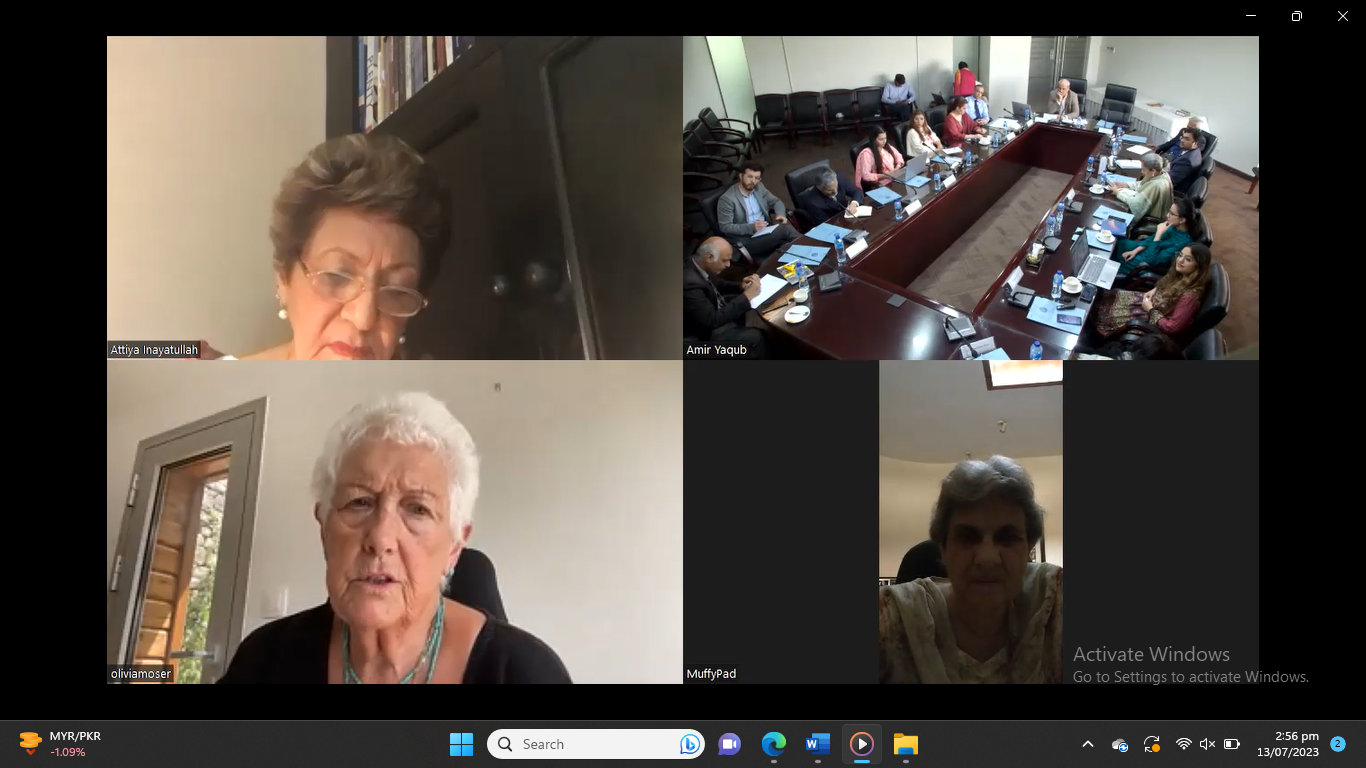Gender, Just Cities, and Development
-Share this story:
Islamabad, July 12, 2023 – The NUST Institute of Policy Studies (NIPS) organized the webinar on ‘’Gender, Just Cities and Development” on Wednesday, July 12, 2023. The webinar was moderated by Mr. Amir Yaqub, Director, NIPS and was attended by academic experts, development practitioners, think tank specialists, researchers, and students.
The globally renowned academic and gender expert practitioner, Dr. Caroline Moser, Emeritus Professor, the University of Manchester and Honorary Professor, Bartlett Development Planning Unit (DPU), University College London, delivered the keynote address on gender planning, urban gender transformation, and just cities. In a distinguished career spanning more than forty years, Dr Moser has taught and conducted research at leading British universities and undertaken training and advisory work with globally renowned organizations like the World Bank, DFID, Brookings Institution, Ford Foundation, Overseas Development Institute, International Committee of Red Cross (ICRC), International Development Research Centre (IDRC), and UNICEF.
Talking about her Gender Transformation Framework (GTF), Dr. Moser underscored that the framework was focused on creating multiple urban strategies of asset accumulation related to different types of assets, such as, physical (land and housing), financial (income generation), human (health and education), and social (involving household and community levels). Dr. Moser explained that it is aimed at reducing poverty through addressing practical gender needs, empowering individual women; and enabling gender transformation through successfully challenging power relations by means of collective action and institutional partnerships. She added that the framework is especially helpful in charting a range of gendered transformative pathways to just and equitable cities through a dynamic configuration of positive and negative drivers, asset accumulation based on careful assortment of asset types, and the combined action of social, cultural, and institutional factors.
Dr. Moser shared that during her work with the U.K.’s Department for International Development (DFID) in 2016 on Infrastructure and Cities for Economic Development (ICED) facility (ICED) – before DFID’s merger in September 2020 with Britian’s Foreign and Commonwealth Office (FCO) to become Foreign, Commonwealth, and Development Office (FCDO) – Gender Transformation Framework became the basis for the Gender and Inclusion Framework (GIF), which, ICED, then, incorporated into several of its programs. Dr. Moser explained that GIF contains three different levels of impact and outcomes of infrastructure investments, namely: minimal compliance consisting of programs that address the basic needs and vulnerabilities of women and marginalized groups; empowerment consisting of asset accumulation and capacity building programs for women; and structural transformation comprising program. that deal with unequal power relations by means of seeking legal and institutional change at the broader societal level.
Dr. Moser’s lecture dissected two underlying concepts involved in her work as a feminist research and gender professional, namely, reflexivity and positionality. Reflexivity in feminist research entails a self-critical scrutiny of oneself as a researcher in the context of the feminist concern for objective research. Positionality, on the other hand, focuses on power relations in the research process and operates at the institutional and individual level.
Dr. Moser emphasized that empowerment and transformation differ in terms of their conceptualization and focus. Gender empowerment describes how individual women through their individual agency increase their bargaining power in public and private spheres to participate fully in political and economic spheres. Gender transformation emphasizes structural changes in gender power relations and collective efforts, struggle, and negotiation. Dr. Moser especially cautioned against conflating the individual agency of women and gender power relations.
The second keynote speaker, Dr. Attiya Inayatullah, former Federal Minister for Population and Women’s Development and President Emeritus Family Planning Association of Pakistan, talked about women’s agency, social norms, and the right to human development in Pakistan. Dr. Inayatullah highlighted the toxic effects of patriarchy on the agenda of gender equality and sustainable development in Pakistan. She pointed out there existed an attitudinal and perceptual time warp that distorts policy approaches aimed at addressing gender inequality in the country. She remarked that the confluence of transmitted tradition and learned behavior reinforces structures of gender inequality and considerably constricts the agency of Pakistani women.
Dr. Inayatullah stressed the importance of local campaigns and agenda setting for gender equality to be informed by awareness and knowledge of diverse global experiences in the field. She emphasized that society could nurture women’s agency and protect their right to development by ensuring collective efforts rather than a “men-versus-women” binary worldview. She said that there is a need to remove social and institutional barriers and have a participatory approach to establish inclusive contexts for gender equality.
The keynotes were followed by an extensive discussion session wherein attendees articulated relevant points regarding gender planning, urban gender transformation, inclusive development, gender collaboration, household and community decision-making, and equitable gender-based asset accumulation strategies.




